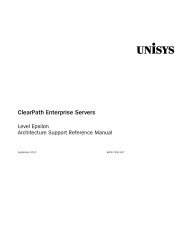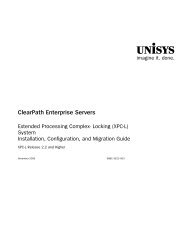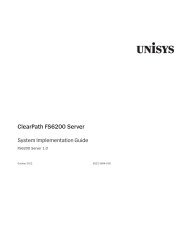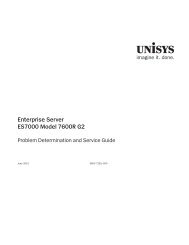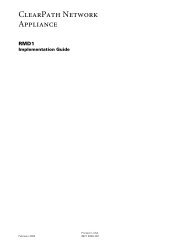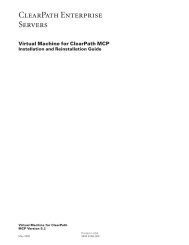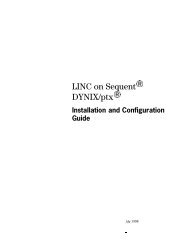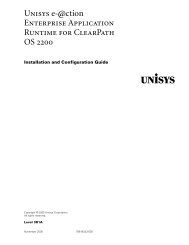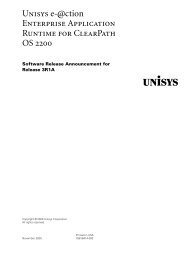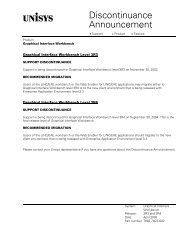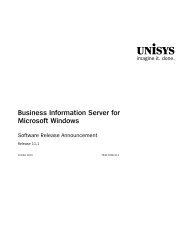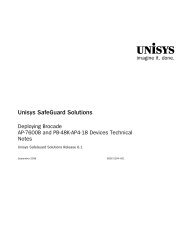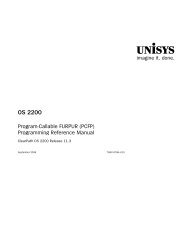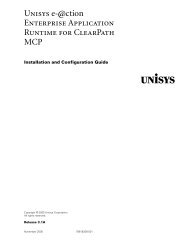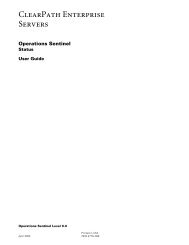- Page 1 and 2:
OS 2200 System Service Routines Lib
- Page 3:
OS 2200 System Service Routines Lib
- Page 6 and 7:
Contents 4.2.5. Error Status Codes
- Page 8 and 9:
Contents 14.1.4. Reusable Processor
- Page 10 and 11:
Contents Section 19. SAR$ ATREAD ..
- Page 12 and 13:
Contents Section 23. SIR$-Symbolic
- Page 14 and 15:
Contents Appendix J. Obsolete Entry
- Page 16 and 17:
Figures xiv 7833 1733-004
- Page 18 and 19:
Tables 20-1. SAR$: PLUS COM Buffer
- Page 20 and 21:
Introduction 1.2. Notation Conventi
- Page 22 and 23:
Introduction Numbers are represente
- Page 24 and 25:
Introduction If you install SYSLIB
- Page 26 and 27:
System Standard Procedures and Defi
- Page 28 and 29:
System Standard Procedures and Defi
- Page 30 and 31:
System Standard Procedures and Defi
- Page 32 and 33:
System Standard Procedures and Defi
- Page 34 and 35:
System Standard Procedures and Defi
- Page 36 and 37:
SYSLIB Access Methods All the SYSLI
- Page 38 and 39:
SYSLIB Access Methods This type of
- Page 40 and 41:
SYSLIB Access Methods 3-6 7833 1733
- Page 42 and 43:
AEDIT$-ASCII Image Composition Edit
- Page 44 and 45:
AEDIT$-ASCII Image Composition Edit
- Page 46 and 47:
AEDIT$-ASCII Image Composition Edit
- Page 48 and 49:
AEDIT$-ASCII Image Composition Edit
- Page 50 and 51:
AEDIT$-ASCII Image Composition Edit
- Page 52 and 53:
AEDIT$-ASCII Image Composition Edit
- Page 54 and 55:
AEDIT$-ASCII Image Composition Edit
- Page 56 and 57:
AEDIT$-ASCII Image Composition Edit
- Page 58 and 59:
AEDIT$-ASCII Image Composition Edit
- Page 60 and 61:
AEDIT$-ASCII Image Composition Edit
- Page 62 and 63:
AEDIT$-ASCII Image Composition Edit
- Page 64 and 65:
AEDIT$-ASCII Image Composition Edit
- Page 66 and 67:
AEDIT$-ASCII Image Composition Edit
- Page 68 and 69:
BSP$-Program File Basic Service Pac
- Page 70 and 71:
BSP$-Program File Basic Service Pac
- Page 72 and 73:
BSP$-Program File Basic Service Pac
- Page 74 and 75:
BSP$-Program File Basic Service Pac
- Page 76 and 77:
BSP$-Program File Basic Service Pac
- Page 78 and 79:
BSP$-Program File Basic Service Pac
- Page 80 and 81:
BSP$-Program File Basic Service Pac
- Page 82 and 83:
BSP$-Program File Basic Service Pac
- Page 84 and 85:
BSP$-Program File Basic Service Pac
- Page 86 and 87:
BSP$-Program File Basic Service Pac
- Page 88 and 89:
BSP$-Program File Basic Service Pac
- Page 90 and 91:
BSP$-Program File Basic Service Pac
- Page 92 and 93:
BSP$-Program File Basic Service Pac
- Page 94 and 95:
BSP$-Program File Basic Service Pac
- Page 96 and 97:
BSP$-Program File Basic Service Pac
- Page 98 and 99:
BSP$-Program File Basic Service Pac
- Page 100 and 101:
BSP$-Program File Basic Service Pac
- Page 102 and 103:
BSP$-Program File Basic Service Pac
- Page 104 and 105:
BSP$-Program File Basic Service Pac
- Page 106 and 107:
CABSAD$, CRELAD$-Addressing Routine
- Page 108 and 109:
CABSAD$, CRELAD$-Addressing Routine
- Page 110 and 111:
CABSAD$, CRELAD$-Addressing Routine
- Page 112 and 113:
CABSAD$, CRELAD$-Addressing Routine
- Page 114 and 115:
CABSAD$, CRELAD$-Addressing Routine
- Page 116 and 117:
CABSAD$, CRELAD$-Addressing Routine
- Page 118 and 119:
CABSAD$, CRELAD$-Addressing Routine
- Page 120 and 121:
CONWRD$-Condition Word Routine Para
- Page 122 and 123:
CONWRD$-Condition Word Routine 7-4
- Page 124 and 125:
EDIT$-Fieldata Image Composition Ed
- Page 126 and 127:
EDIT$-Fieldata Image Composition Ed
- Page 128 and 129:
EDIT$-Fieldata Image Composition Ed
- Page 130 and 131:
EDIT$-Fieldata Image Composition Ed
- Page 132 and 133:
EDIT$-Fieldata Image Composition Ed
- Page 134 and 135:
FDASC$-Fieldata/ASCII Data Conversi
- Page 136 and 137:
FDASC$-Fieldata/ASCII Data Conversi
- Page 138 and 139:
GETPSF$-Get a Scratch File Routine
- Page 140 and 141:
GETPSF$-Get a Scratch File Routine
- Page 142 and 143:
GETPSF$-Get a Scratch File Routine
- Page 144 and 145: ID$-Identification Line Routine Exe
- Page 146 and 147: ID$-Identification Line Routine Bit
- Page 148 and 149: ID$-Identification Line Routine Err
- Page 150 and 151: ID$-Identification Line Routine 11.
- Page 152 and 153: ID$-Identification Line Routine Bit
- Page 154 and 155: ID$-Identification Line Routine 11.
- Page 156 and 157: ID$-Identification Line Routine err
- Page 158 and 159: INFOR$-Internal Format Table Interf
- Page 160 and 161: INFOR$-Internal Format Table Interf
- Page 162 and 163: INFOR$-Internal Format Table Interf
- Page 164 and 165: INFOR$-Internal Format Table Interf
- Page 166 and 167: INFOR$-Internal Format Table Interf
- Page 168 and 169: INFOR$-Internal Format Table Interf
- Page 170 and 171: MFDSP$-Master File Directory Servic
- Page 172 and 173: MFDSP$-Master File Directory Servic
- Page 174 and 175: MFDSP$-Master File Directory Servic
- Page 176 and 177: MFDSP$-Master File Directory Servic
- Page 178 and 179: MFDSP$-Master File Directory Servic
- Page 180 and 181: MFDSP$-Master File Directory Servic
- Page 182 and 183: PREPRM, PREPRO, PREPF$, and POSTPR$
- Page 184 and 185: PREPRM, PREPRO, PREPF$, and POSTPR$
- Page 186 and 187: PREPRM, PREPRO, PREPF$, and POSTPR$
- Page 188 and 189: PREPRM, PREPRO, PREPF$, and POSTPR$
- Page 190 and 191: PREPRM, PREPRO, PREPF$, and POSTPR$
- Page 192 and 193: PREPRM, PREPRO, PREPF$, and POSTPR$
- Page 196 and 197: ROR, ROR$-Relocatable Output Routin
- Page 198 and 199: ROR, ROR$-Relocatable Output Routin
- Page 200 and 201: ROR, ROR$-Relocatable Output Routin
- Page 202 and 203: ROR, ROR$-Relocatable Output Routin
- Page 204 and 205: SAR$-Symbolic Access Routines 16.1.
- Page 206 and 207: SAR$-Symbolic Access Routines FILE_
- Page 208 and 209: SAR$-Symbolic Access Routines NEXT_
- Page 210 and 211: SAR$-Symbolic Access Routines FIP$A
- Page 212 and 213: SAR$-Symbolic Access Routines FIP$H
- Page 214 and 215: SAR$-Symbolic Access Routines 16.2.
- Page 216 and 217: SAR$-Symbolic Access Routines 16-14
- Page 218 and 219: SAR$ READ 17.1.1.1. Required Inform
- Page 220 and 221: SAR$ READ REQUEST_TYPE PLUS Attribu
- Page 222 and 223: SAR$ READ READ_ADDRESS_WORD_OFFSET
- Page 224 and 225: SAR$ READ CHARACTER_CODE PLUS Attri
- Page 226 and 227: SAR$ READ CONTROL_RECORD_WORD_LENGT
- Page 228 and 229: SAR$ READ The default buffer and ta
- Page 230 and 231: SAR$ READ 17.1.3.2. SAR_READ Proced
- Page 232 and 233: SAR$ READ 17.1.3.4. Example The fol
- Page 234 and 235: SAR$ READ Table 17-3. SAR$: READ Pr
- Page 236 and 237: SAR$ READ 17.2. READ Function/MASM
- Page 238 and 239: SAR$ READ SR$REQTYPE The requested
- Page 240 and 241: SAR$ READ SR$CALLST The status code
- Page 242 and 243: SAR$ READ SR$SDFICW The image contr
- Page 244 and 245:
SAR$ READ 17.2.3.1. Open-Input Proc
- Page 246 and 247:
SAR$ READ 17.2.3.3. Close-Input Pro
- Page 248 and 249:
SAR$ READ Table 17-6. SAR$: READ Pr
- Page 250 and 251:
SAR$ READ 17.3.3. ASCII/ISO with Em
- Page 252 and 253:
SAR$ WRITE The calling program must
- Page 254 and 255:
SAR$ WRITE 18.1.1.2. Optional Infor
- Page 256 and 257:
SAR$ WRITE OUTPUT_IMAGE_CHARACTER_T
- Page 258 and 259:
SAR$ WRITE LINE_NUMBER_INTEGER_PART
- Page 260 and 261:
SAR$ WRITE IMAGE_BYTE_LENGTH PLUS A
- Page 262 and 263:
SAR$ WRITE The default buffer and t
- Page 264 and 265:
SAR$ WRITE 18.1.3.2. SAR_WRITE Proc
- Page 266 and 267:
SAR$ WRITE S'Print_heading' Insert
- Page 268 and 269:
SAR$ WRITE 18.1.3.5. Example The fo
- Page 270 and 271:
SAR$ WRITE Table 18-3. SAR$: WRITE
- Page 272 and 273:
SAR$ WRITE Empty symbiont output fi
- Page 274 and 275:
SAR$ WRITE SW$OUTRECT The type of r
- Page 276 and 277:
SAR$ WRITE SW$ELTCDT For SDF elemen
- Page 278 and 279:
SAR$ WRITE 18.2.1.4. WRITE Packet D
- Page 280 and 281:
SAR$ WRITE • Optional parameters
- Page 282 and 283:
SAR$ WRITE Initial Condition The ca
- Page 284 and 285:
SAR$ WRITE Table 18-6. SAR$: WRITE
- Page 286 and 287:
SAR$ WRITE 18-36 7833 1733-004
- Page 288 and 289:
SAR$ ATREAD 19.1.1.1. Required Info
- Page 290 and 291:
SAR$ ATREAD Other character set typ
- Page 292 and 293:
SAR$ ATREAD OUTPUT_IMAGE_BYTE_LENGT
- Page 294 and 295:
SAR$ ATREAD 19.1.3. ATREAD Procedur
- Page 296 and 297:
SAR$ ATREAD • Attributes The addr
- Page 298 and 299:
SAR$ ATREAD Table 19-3. SAR$: ATREA
- Page 300 and 301:
SAR$ ATREAD SA$OTEXTB The address o
- Page 302 and 303:
SAR$ ATREAD 19.2.1.3. Information R
- Page 304 and 305:
SAR$ ATREAD 19.2.1.5. ATREAD Packet
- Page 306 and 307:
SAR$ ATREAD • Optional parameters
- Page 308 and 309:
SAR$ ATREAD S$ARATREAD does not spa
- Page 310 and 311:
SAR$ ATREAD Table 19-6. SAR$: ATREA
- Page 312 and 313:
SAR$ COM OUTPUT_TEXT_BUFFER_ADDRESS
- Page 314 and 315:
SAR$ COM INPUT_SELECT_LIST_ADDRESS
- Page 316 and 317:
SAR$ COM 20.1.1.3. Information Retu
- Page 318 and 319:
SAR$ COM 20.1.3. SAR$ COM Procedure
- Page 320 and 321:
SAR$ COM Table 20-3. SAR$: COM Proc
- Page 322 and 323:
SAR$ COM 20.2.1.2. Optional Informa
- Page 324 and 325:
SAR$ COM SC$RUNIDW1 The first four
- Page 326 and 327:
SAR$ COM Example $ASCII $INCLUDE
- Page 328 and 329:
SAR$ COM • Optional parameters (d
- Page 330 and 331:
SAR$ COM Table 20-5. SAR$: COM Proc
- Page 332 and 333:
SDFI, SDFO-System Data Format I/O R
- Page 334 and 335:
SDFI, SDFO-System Data Format I/O R
- Page 336 and 337:
SDFI, SDFO-System Data Format I/O R
- Page 338 and 339:
SDFI, SDFO-System Data Format I/O R
- Page 340 and 341:
SDFI, SDFO-System Data Format I/O R
- Page 342 and 343:
SDFI, SDFO-System Data Format I/O R
- Page 344 and 345:
SDFI, SDFO-System Data Format I/O R
- Page 346 and 347:
SDFI, SDFO-System Data Format I/O R
- Page 348 and 349:
SDFI, SDFO-System Data Format I/O R
- Page 350 and 351:
SFDT$-System Standard Format Date a
- Page 352 and 353:
SFDT$-System Standard Format Date a
- Page 354 and 355:
SFDT$-System Standard Format Date a
- Page 356 and 357:
SFDT$-System Standard Format Date a
- Page 358 and 359:
SFDT$-System Standard Format Date a
- Page 360 and 361:
SFDT$-System Standard Format Date a
- Page 362 and 363:
SIR$-Symbolic Input/Output Routine
- Page 364 and 365:
SIR$-Symbolic Input/Output Routine
- Page 366 and 367:
SIR$-Symbolic Input/Output Routine
- Page 368 and 369:
SIR$-Symbolic Input/Output Routine
- Page 370 and 371:
SIR$-Symbolic Input/Output Routine
- Page 372 and 373:
SIR$-Symbolic Input/Output Routine
- Page 374 and 375:
SIR$-Symbolic Input/Output Routine
- Page 376 and 377:
SIR$-Symbolic Input/Output Routine
- Page 378 and 379:
SIR$-Symbolic Input/Output Routine
- Page 380 and 381:
SIR$-Symbolic Input/Output Routine
- Page 382 and 383:
SIR$-Symbolic Input/Output Routine
- Page 384 and 385:
Program Trace Routine • The follo
- Page 386 and 387:
Program Trace Routine Tracing can b
- Page 388 and 389:
Program Trace Routine In each of th
- Page 390 and 391:
Program Trace Routine In demand mod
- Page 392 and 393:
Program Trace Routine CAPTUR Enters
- Page 394 and 395:
Program Trace Routine T L B S E N D
- Page 396 and 397:
Program Trace Routine LINE Adjusts
- Page 398 and 399:
Program Trace Routine SET L N Print
- Page 400 and 401:
Program Trace Routine 24.5. Control
- Page 402 and 403:
Program Trace Routine 24-20 7833 17
- Page 404 and 405:
SOR-Symbolic Output Routine SOR ins
- Page 406 and 407:
SOR-Symbolic Output Routine 25.3. O
- Page 408 and 409:
SOR-Symbolic Output Routine 25.5. E
- Page 410 and 411:
Using SYSLIB A-2 7833 1733-004
- Page 412 and 413:
Diagnostic Messages x FILE NOT AVAI
- Page 414 and 415:
Diagnostic Messages SIR EDIT ERR c
- Page 416 and 417:
Diagnostic Messages B-6 7833 1733-0
- Page 418 and 419:
SYSLIB Restrictions C-2 7833 1733-0
- Page 420 and 421:
SYSLIB Elements Table D-1. SYSLIB E
- Page 422 and 423:
SYSLIB Elements Table D-1. SYSLIB E
- Page 424 and 425:
SYSLIB Elements D-6 7833 1733-004
- Page 426 and 427:
SYSLIB Common Bank Entry Points Tab
- Page 428 and 429:
SYSLIB Common Bank Entry Points Tab
- Page 430 and 431:
SYSLIB Common Bank Entry Points E-6
- Page 432 and 433:
Interface to Selected Extended Mode
- Page 434 and 435:
Interface to Selected Extended Mode
- Page 436 and 437:
Interface to Selected Extended Mode
- Page 438 and 439:
INFOR Information A field in the pr
- Page 440 and 441:
INFOR Information Word 0 Bits 0-9 T
- Page 442 and 443:
INFOR Information Bits 18-23 File C
- Page 444 and 445:
INFOR Information G.4. INFOR Table
- Page 446 and 447:
INFOR Information G-10 7833 1733-00
- Page 448 and 449:
ASCII-like Character Sets Table H-1
- Page 450 and 451:
ASCII-like Character Sets H-4 7833
- Page 452 and 453:
Extended Mode Interface to SYSLIB I
- Page 454 and 455:
Extended Mode Interface to SYSLIB T
- Page 456 and 457:
Extended Mode Interface to SYSLIB b
- Page 458 and 459:
Extended Mode Interface to SYSLIB I
- Page 460 and 461:
Extended Mode Interface to SYSLIB P
- Page 462 and 463:
Extended Mode Interface to SYSLIB I
- Page 464 and 465:
Extended Mode Interface to SYSLIB T
- Page 466 and 467:
Extended Mode Interface to SYSLIB T
- Page 468 and 469:
Extended Mode Interface to SYSLIB I
- Page 470 and 471:
Obsolete Entry Points, PROCs, and R
- Page 472 and 473:
Obsolete Entry Points, PROCs, and R
- Page 474 and 475:
Obsolete Entry Points, PROCs, and R
- Page 476 and 477:
Obsolete Entry Points, PROCs, and R
- Page 478 and 479:
Obsolete Entry Points, PROCs, and R
- Page 480 and 481:
Obsolete Entry Points, PROCs, and R
- Page 482 and 483:
Obsolete Entry Points, PROCs, and R
- Page 484 and 485:
Obsolete Entry Points, PROCs, and R
- Page 486 and 487:
Obsolete Entry Points, PROCs, and R
- Page 488 and 489:
Obsolete Entry Points, PROCs, and R
- Page 490 and 491:
Related Product Information OS 1100
- Page 492 and 493:
Glossary Exec The kernel of the OS
- Page 494 and 495:
Glossary Problem list entry (PLE) A
- Page 496 and 497:
Index Fieldata characters, 8-1 floa
- Page 498:
Index read call, 21-8 SDFO close ca



